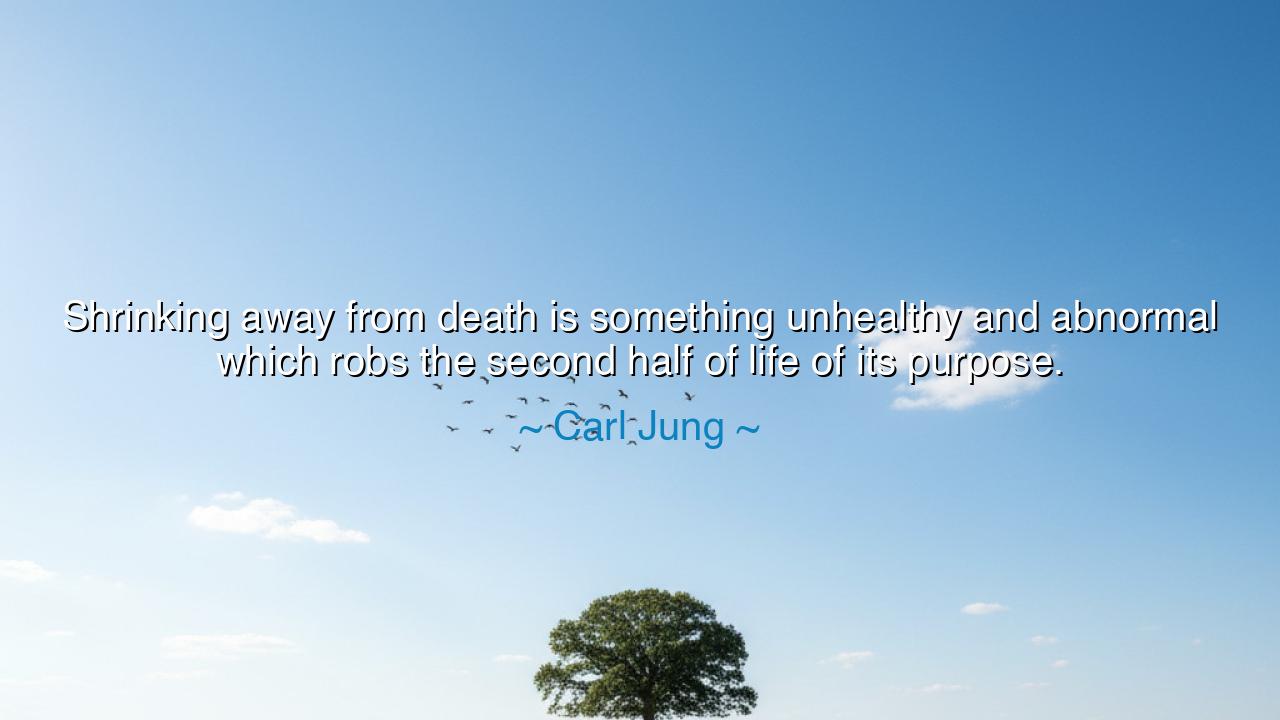
Shrinking away from death is something unhealthy and abnormal
Shrinking away from death is something unhealthy and abnormal which robs the second half of life of its purpose.






“Shrinking away from death is something unhealthy and abnormal which robs the second half of life of its purpose.” Thus spoke Carl Jung, the great seer of the human soul, who sought to unite the light and shadow within man. In these few words, he delivers a truth both unsettling and liberating—that to fear death is to fear life itself. For he saw that the first half of our journey is spent building—gathering knowledge, wealth, love, and identity—while the second half must be spent in surrender, in the understanding that all these things shall pass. To resist that truth, Jung warns, is to rob the elder years of their sacred task: the acceptance of mortality, and through it, the discovery of eternity.
Jung was not merely a psychologist but a philosopher of the spirit, one who believed that every human life mirrors the rhythm of the cosmos. He taught that the first half of life is a movement outward—toward creation, expansion, and conquest—while the second half must turn inward, toward reflection, meaning, and reconciliation with the inevitable. In this inward turning, death ceases to be an enemy and becomes a teacher. To “shrink away” from it, as he says, is to cling to youth, to possessions, to vanities that no longer serve the soul’s growth. It is to deny the wisdom that comes only when one learns to die—not just at life’s end, but to die daily to fear, to ego, and to attachment.
The origin of this quote lies in Jung’s writings on aging and the development of the self. He saw in modern man a spiritual illness: the obsession with staying young, the terror of decay, the refusal to acknowledge mortality. This denial, he believed, poisons the soul, turning what should be a time of peace and integration into anxiety and despair. For if the first half of life is about achievement, the second half must be about transcendence. One who flees from death cannot enter that stage, for he clings to what must naturally fall away. Jung’s insight was radical because it saw death not as a tragedy, but as the final and necessary act of wholeness—the return of the soul to its origin.
To understand his meaning, we can turn to the story of Socrates, the ancient philosopher who met death with serenity. When condemned to drink the hemlock, he did not weep or rage, but told his students that death was merely the release of the soul from the prison of the body. “No evil can happen to a good man,” he said, and faced his end as calmly as one who lays down to sleep. Socrates had lived the truth Jung later spoke: he did not shrink away from death, and thus his final act was not despair, but illumination. By accepting death, he transcended it.
In contrast, those who deny death often find their later years hollow and restless. They grasp at youth with trembling hands, seeking through pleasures or pride to escape the truth of time. Yet in doing so, they miss the deeper purpose of life’s second half—to prepare the soul for union with the eternal. Jung saw that those who make peace with death are freed from the fear of loss; they begin to live with greater depth, compassion, and meaning. They see beauty not in permanence, but in impermanence—like autumn leaves glowing brightest just before they fall. Such people, he said, embody true wisdom, for they live with their eyes on both the earth and the infinite.
In this way, Jung’s words are not a counsel of despair, but of transformation. He calls us to recognize that death is not destruction, but transition—the soul’s next great adventure. By facing death, we also face life anew, stripped of illusion. For the one who accepts death no longer fears change; he learns to let go, to forgive, to love without possession. Every moment becomes precious, every breath an offering. To embrace death, then, is to awaken to eternity within the present.
So, O seeker, take this wisdom into your heart: do not flee from the thought of death. Sit with it as you would with an old friend. Let it remind you of what truly matters and of what must be released. In doing so, you will find that death no longer haunts you—it humbles you, softens you, prepares you for peace. Begin even now to live the second half of life as Jung intended—not in fear, but in faith. When you cease to shrink from death, you will discover the great paradox: that in accepting your mortality, you awaken to immortality, and that in surrendering the fear of the end, you begin, at last, to truly live.






AAdministratorAdministrator
Welcome, honored guests. Please leave a comment, we will respond soon